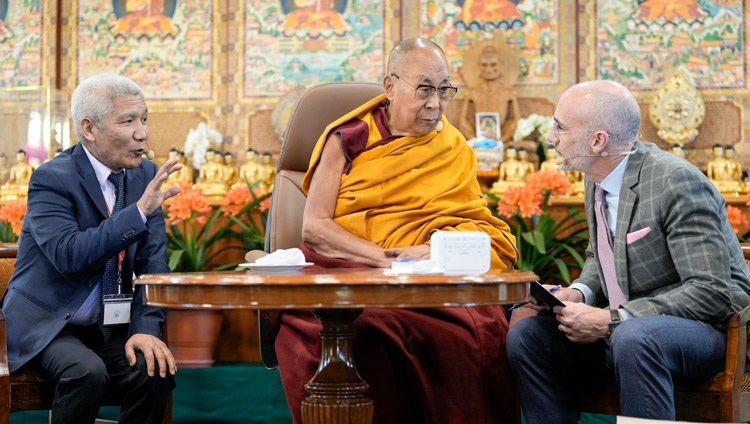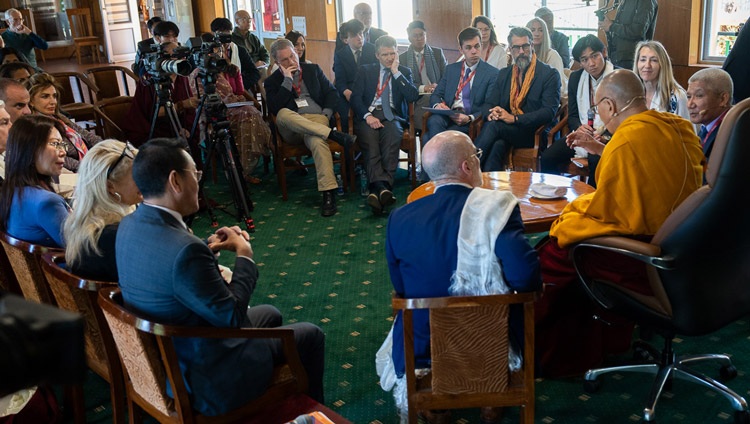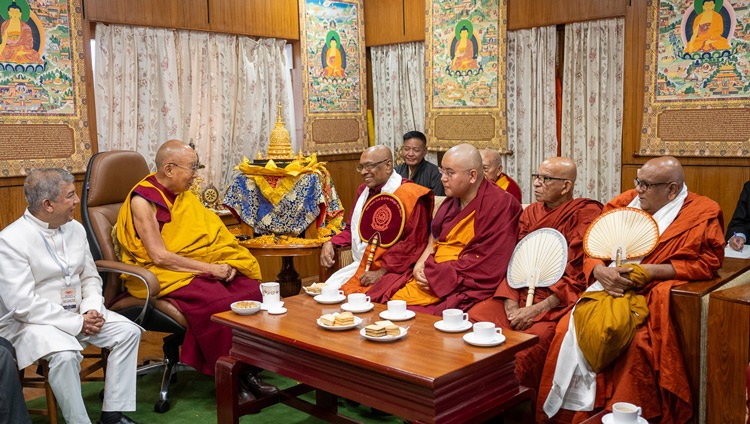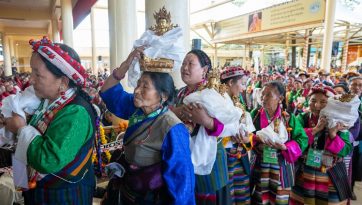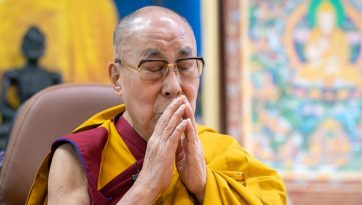Statement of Tibetan Parliament on His Holiness the Dalai Lama’s 78th Birthday
Today is a uniquely important day for it marks the birthday of His Holiness the 14th Dalai Lama, the Bodhisattva Chenrezig who has descended to this earth in human emanation, the spiritual lord of the Three Realms of dwelling, a champion of world peace, the master on this earth of all the teachings of the Buddha, the saviour of all the Tibetans, and a leader treasured by all and excelled by none.
For the sake of all the sentient beings in general terms and especially for the benefit of the sentient beings of the Snowland of Tibet, His Holiness took birth on the 5th day of the 5th month in the Wood-Pig Year of the 16th Tibetan Royal Sexantry, which corresponded to the 6th day of July 1935, in the village of Tagtser in the Kumbum area of the Tibetan province of Domey. He was born to parents of excellently endowed lineage and blood amid numerous wondrously auspicious signs and omens. On such a completely auspicious day as today, we offer our greetings and obeisance to His Holiness with unflinching devotion of body, speech and mind. At the same time we pray ardently, and with great strength of commitment, that His Holiness, the sacred saviour of all sentient beings so numerous as to fill the sky above us, in general terms and, especially, with the people of the Snowland of Tibet, and a great champion of world peace, live for as long as a hundred aeons. We also pray that His Holiness, on that basis, indebt us with the ambrosia of His sound guidance on the basis of the clarity of His vision over the three time realms and in such continuous manner as the flow of the steady summer stream.
Having committed to make the sentient beings of the Snowland of Tibet the object of His spiritual deliverance, His Holiness took birth in such numerous human forms as kings, ministers and Bodhisattvas, and accomplished various vast deeds for the benefit of the Buddhist faith. Since the time of the Great Fifth, successive reincarnations of His Holiness the Dalai Lama have assumed both spiritual and temporal leadership of Tibet and exercised responsibility over its sentient beings with great sense of authority. In particular, His Holiness the great 14th Dalai Lama assumed his temporal and spiritual leadership of Tibet when He was only 16 years old. After having done so, He set out to reform the old system of Tibet. And He also underwent multitudes of hardships through various creative and compassionate efforts in dealing with communist China. After arriving in India in exile, He set up the basic structure of a government in exile afresh and in the course of it presented to the Tibetan people a democratic system whereby a Tibetan parliament in exile was set up in 1960. Later in 1963, He proclaimed a democratic constitution for a future free Tibet. In 1991, He took other measures, such as raising the strength of the Tibetan parliament in exile, and transformed it into a genuine legislative body. He later gave his assent to the Charter of the Tibetans in Exile which had been passed by the Tibetan parliament in exile. Further, in order to complete the process of full democratization of the Tibetan system in exile and on the basis of discerning the numerous immediate and long term potential problems and purposes, His Holiness has now transferred all his political and administrative powers to the leadership in exile elected by the Tibetan people. By such and numerous other means over the last more than 60 years, His Holiness has taken up with spontaneous diligence an array of tasks that entailed a multitude of hardships on him for the immediate and long term well being and benefit of Tibet and the Tibetan people.
Even after having transferred his political and administrative powers to the elected Tibetan leadership in exile, His Holiness has, as prayed to, graciously assented to assume the role of the Protector and Symbol of Tibet and the Tibetan people. In that capacity He has undertaken to offer counsel on any religious or political issue concerning the Tibetan people, as well as to provide suggestions to the Tibetan Parliament in exile and the Kashag on important matters of politics and religion as and when He sees it necessary to do so. This undertaking extends also to meeting with and holding discussions with important international leaders and personalities on behalf of Tibet and the Tibetan people. In keeping with the undertakings He has given very kindly on matters such as these, His Holiness continues to assume great responsibilities on behalf of the Tibetan people. There is no way we the Tibetan people can claim to be in a position to repay over a hundred lifetimes even a tiny fraction of the enormous gratitude we owe to His Holiness. Nevertheless, we, acting on behalf of Tibetans both in and outside Tibet, and with a solemn body, speech and mind obeisance, make it a point to express our gratitude to His Holiness, if only to make it clear that out indebtedness to him will remain in our hearts without ever being forgotten. At the same time, we pray with utmost intensity of devotion that for as long as the sky above us remains, His Holiness continue to hold the misery afflicted people of the Tibetan Land of Snows in compassion and extend to them as before His beneficial deeds.
It especially bears mention that through lectures and guidance on compassion, tolerance and universal responsibility for the benefit of all the sentient beings of this world, His Holiness continues to assume great responsibility to bring peace upon the entire humanity. He also continues to take it upon himself to seek to inculcate ethical values in everyone, irrespective of the question whether one believes in any religion or not, for the benefit of humanity in general and for the purposes of protecting the global environment. In an effort to bring about harmony among the different religions in this world, His Holiness has held discussions with numerous leaders of different religious faiths with an approach of broadmindedness and liberalism and has thereby also sought to dispel doubts and to deal with the differences among them. In particular, His Holiness has taken great responsibility to ensure a coexistent march between Buddhism and modern science with each side benefiting from the other through an appreciative understanding of each other’s respective strengths and weaknesses. By such means as above, His Holiness has undertaken, and continues to undertake, political and spiritual deeds of enormous dimensions, becoming a source of merits of enormous value to the sentient beings of this world and a worthy source of sublime contentment to them.
The Middle Way policy is mutually beneficial to both the Chinese and Tibetan sides, is in keeping with His Holiness the Dalai Lama’s wishes, has been adopted by the Central Tibetan Administration at Dharamsala, and is being actively pursued by the latter. It has received as much support as possible from all conceivable quarters, both private and public, from across the world, including from governments of many countries. In particular, it is appreciated and supported by enormous number of people within China, including especially by Chinese intellectuals. As this is directly concerned with the immediate and long term interests of both the Chinese and Tibetan peoples, it is high time for the government of China to greatly enhance its sense of responsibility and make efforts towards resolving the Sino-Tibetan dispute as soon as possible and at the earliest possible opportunity.
On 9 March 2013, during his meeting with the delegates from Tibet Autonomous Region to the Chinese National People’s Congress, General Secretary Mr. Xi Jinping of the Communist Party of China, after having made the usual Chinese remarks about Tibet being an inalienable part of China and so on, clearly acknowledged the region’s special characteristics. He said that the stability and prosperity of Tibet could be ensured if, among other things, there was a fruitful implementation there of the country’s laws governing the administration of ethnic autonomous areas, including with the assurance of respect for the Tibetan people’s religious freedom and the protection of the Tibetan language and culture. In June recently, Jin Wei, a professor at the Central Party School in Beijing, in answering questions during an interview with a Hong Kong publication, said that the central government of China should revive peace talks with envoys of His Holiness the Dalai Lama. She also said that there had been anti-religious bias in the policies followed by successive Party Secretaries of the Tibet Autonomous Region. These remarks reveal that the Chinese government now accepts that the policies it had implemented in Tibet previously had been wrong. News reports related to this development have been continuing to appear over the internet in recent times and if they are true we do not know whether they show a new positive change on the part of the government of China or whether they are designed only to be used as a tool to make false allegations against innocent Tibetans. However, as these developments can only contribute towards immense immediate and long term benefits for both the Tibetan and Chinese peoples, we hope that these could be implemented in all the Tibetan inhabited regions.
Also recently, on 9 June, the government of the so-called Tibet Autonomous Region held in Lhasa the first general meeting of delegates of returned overseas Tibetans and their families with the participation of all the top leaders of the region. Remarks on this subject were also made by some leaders of Tibet Autonomous Region during their recent overseas delegation visit. Such actions show a strengthening of efforts by the government of China to implement a policy of trying to entice Tibetans living in exile and thereby to weaken the Tibetan struggle by every possible means and with a renewed vigour. In view of these developments, we would like to remind the Tibetan people to act with care and caution to ensure that they do not get deceived and carried away by the glib and sweet talks and by the temptations of short term, minor economic gains.
We remain hopeful that the hardline policies being implemented in Tibet and on the Tibetan people after China’s current leadership came to power will be changed, that there will thereby be a positive development which is based on the real situation in Tibet and in keeping with the true aspirations of the Tibetan people, and which will also be beneficial to both Tibet and China. We also strongly reiterate our call on China to immediately release all the prisoners in Tibet, including the young Panchen Lama, who are innocent of any crime. This call for immediate release extends especially in the case of the hundreds of innocent Tibetans who had been arrested, jailed or persecuted in numerous other ways since the peaceful Tibetan uprising of 2008 and those who staged self-immolation protests thereafter and their alleged accomplices, who continue to suffer to this day. It should be ensured that they are thereby enabled to enjoy the same happiness and well being to which all humans are entitled alike.
In the recent past, there have been reports that on numerous kinds of minor pretexts, Chinese police subjected Tibetans to such unlimited brutal beatings that some of them resulted in deaths. In addition, there have been countless other instances of displays of contempt and bullying against Tibetans. Such instances of abusive behaviours clearly betray the prevalence of discrimination and the absence of the implementation of China’s claimed policy of equality of nationalities and the rule of law. We believe that the government of China must genuinely implement in Tibet its policy of equality of nationalities.
It has been more than 54 years since we took refuge in India and other foreign countries. In particular, India has been like a second homeland to us. Both the government and people of India have extended extensive help, protection, and benefits to the Tibetan people. We take the opportunity provided by this very auspicious occasion to express our gratitude on the basis of remembering at all times our immense indebtedness to the government and people of India. As His Holiness the Dalai Lama especially makes it a point to remind us at all times, all Tibetans living in exile should maintain a strong bond of friendship with the people of the local host community wherever they may be living and thereby maintain such conduct as to benefit the reputation of the Tibetan people in general, their sense of loyalty, and to the orderliness of the local social situation. This is a requirement of immense importance and we make it a point to appeal to all Tibetans accordingly.
In conclusion, we pray that His Holiness the Dalai Lama live for as long as a hundred aeon, that all His sacred wishes be fulfilled with spontaneity, and that the just cause of the Tibetan people may definitely see the light of the day as soon as possible.
6 July 2013

